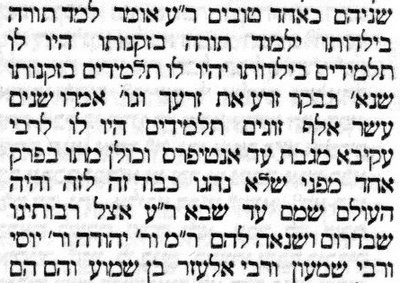The Omer: Why Do We Mourn?
I would certainly be remiss if I limited my 'Omer observations' to comments on other peoples' blogs and failed to reproduce them here, on my own. These observations are not my own, except insofar as I have adopted them, and they are based on both archaeological and textual evidence. The following is the tradition as it has been handed down:

 bYeb 62b
bYeb 62bThe following is my translation:
Rabbi Akiva says, "He who learned in his youth will learn in his old age; he who had disciples in his youth will have disciples in his old age, as it says: 'Sow your seed in the morning', etc." [Qoh 11:6. The full quote, courtesy of JPS, reads: "Sow your seed in the morning, and don't hold back your hand in the evening, since you don't know which is going to succeed, the one or the other, or if both are equally good". This passage in the Talmud appears as part of a baraita and Rabbi Akiva is effectively disagreeing with Rabbi Yehoshua, whose opinion concerning the meaning of this verse is the reason for the Talmud mentioning the baraita in the first place.]
They said, "Rabbi Akiva had 12,000 pairs of disciples between GBT and 'NTYPRS [two cities, according to Rashi] and they all died at one time for they did not respect one another [lit. 'because they did not practise respect']. The world was desolate [due to its lack of Torah scholars: Rashi] until Rabbi Akiva came to the Rabbis of the South and adorned Rabbis Meir, Yehuda, Yossi, Simon and Elazar ben Shamua. And they were the ones who re-established Torah at that time."
[Note: I am unsure of the word ושנאה, which I have here assumed to be √נאה and have taken the ש to be a prefixed relative particle - hence, "and adorned".]
It is taught [concerning Rabbi Akiva's former students] that they all died between Pesakh and the reaping [עצרת, normally a reference to the last day of Sukkot, is here referring to Shavuot instead].
Rav Hama bar Aba (some say, Rav Hiyya bar Abin) said that they all died a horrible death. What was it? Rav Nahman says that it was by choking.
The Talmud then continues by declaring Rabbi Yehoshua correct in this instance and we hear no more of the related incident. Was it history? A resounding no. Aside from the fact that the story of Rabbi Akiva's disciples is brought as part of an ethical aside ("he who has students in his youth..."), are we really to believe that Rabbi Akiva possessed a staggering 24,000 students? There are a little over 4,000 today in Lakewood - one of the world's largest yeshivot! And what is this of a 'choking' plague that wiped them all out "at one time"?
Part of the answer lies within the Palestinian Talmud's version of the story (which is considerably longer). I reproduce here two of the relevent sections:
 pTa'an 68d
pTa'an 68dMy translation:
Rabbi Shimon ben Yohai taught that Akiva, the Rabbi, used to expound upon "a star has gone forth from Jacob" [Num 24:17. Many translations understand the verb as being an imperfective in meaning: 'a star shall go forth...']: "Kosiba has gone forth from Jacob". [This is a play on the similarity of the Hebrew word for star, כוכב, and the name כוסיבא]
When Rabbi Akiva saw bar Kosiba he would exclaim, "It is official that he is the king Messiah!"
Rabbi Yohanan ben Torta said to him, "Akiva! Grass will sprout from your cheeks and the son of David will have still not come."
It is to Rabbi Akiva that we owe the pseudonym "bar Kochba", by which Shimon bar Kosiba is traditionally known. The Rabbis who opposed bar Kosiba (strenghtened, no doubt, by his failure to lead the Jews to victory against the Roman army) named him "bar Koziva" instead. While R' Akiva's designation means 'son of a star', the Rabbis effectively named him 'liar'.
[To be cont.]

0 Comments:
Post a Comment
Subscribe to Post Comments [Atom]
<< Home